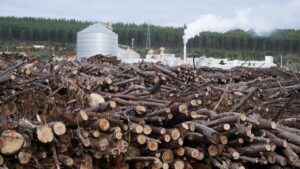
Pinewells pellet plant
Trees from clearcutting in Portuguese nature reserve found to have gone to Drax pellet supplier
21st March 2024 – A new video investigation by Biofuelwatch and the Portuguese NGO ZERO [1] reveals that the Pinewells pellet plant in Portugal, whose biggest customer is Drax in the UK, has been sourcing trees from clearcuts in the mountainous Serra da Lousã nature reserve.
The Serra da Lousã is designated a Natura 2000 site under the EU Habitats Directive. Portuguese legislation does not currently prohibit logging and even clearcutting forests in such nature reserves, which the European Commision has taken the Portuguese government to court over. [2] NGO investigators filmed logging activities and trucks going straight from the nature reserve to the Pinewells plant, which is owned by the Portuguese Grupo Visabeira.
Fernando Amaral, who took part in the investigation as a film-maker, states: “We witnessed pine trees being logged with an excavator inside the nature reserve which already has extensive clearcuts. Inside this sensitive mountain habitat, soils are left bare, with no protection from erosion. We tracked a logging truck from this clearcut all the way to Pinewells, and we’re sure that many more have made the same journey.”
Almuth Ernsting, Co-Director of Biofuelwatch, says: “Drax sourcing pellets from a company that has been using trees cut down in a Portuguese nature reserve is yet another example of the serious impact that their huge biomass power station has on forests in many different countries. We are appalled that the UK government is considering giving Drax yet more subsidies for this destructive business once existing subsidies end in 2027.”
Pinewells, which is Portugal’s largest pellet plant, has been a long-standing supplier of Drax power station in Yorkshire, [3] and in recent years Drax has been the main destination of pellets that the company has produced. It sources large quantities of roundwood, i.e. whole stems, mostly from pine trees.[4] Native pine species used to be the most wide-spread tree species in Portugal, but there has been a steep decline in the extent of pine forests in recent decades, largely due to extensive wildfires. At the same time, harvest rates have increased strikingly, causing fierce competition for increasingly scarce pine wood, and a lack of mature pine forests. This in turn has led to the closure of hundreds of sawmills, and put pressure on the wood panel industry in particular. [5]
According to figures by the pine wood industry association Centro PINUS (Pine Centre), Portugal lost 27% of its pine forest area and 35% in terms of the productivity of pine forests in 15 years. 20% of all pinewood goes to wood pellets, making it the second largest consumer of pine in the country.
Contact:
Almuth Ernsting, Co-Director, Biofuelwatch, biofuelwatch|@gmail.com, Tel 131-6232600
Notes:
[1] youtube.com/playlist?list=PL2MP4qZt4tZ3Tm7Bmxr2r34iYiuOz30OJ
[4] zero.ong/?listas_ficheiros=annual-barometer-wood-pellet-industry-in-portugal-2024
[5] zero.ong/wp-content/uploads/2022/06/barometro-2022-en.pdf
